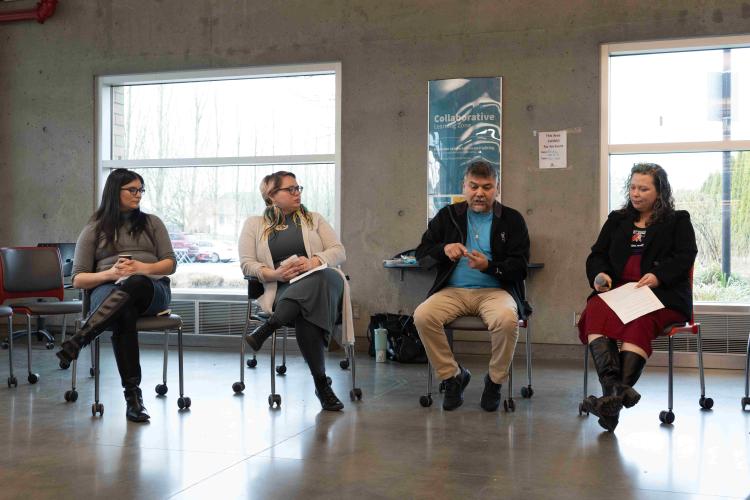June 21 is National Indigenous Peoples Day, when Canada recognizes and celebrates the history, heritage, resilience and diversity of First Nations, Inuit and Métis across the country.
Kwantlen Polytechnic University (KPU) honours this day by celebrating the university's Indigenous residents - Napatsi Folger, Selina Boan and Richard Pierre - who have been sharing their artistry, knowledge and expertise with the university community.

(From left to right) Selina Boan, Napatsi Folger, Richard Pierre and Melinda Bige, Associate Dean in the Faculty of Arts at KPU.
The Faculty of Arts Indigenous residency program fosters community engagement through sharing, dialogue, creativity and intercultural communication, and is an example of KPU's commitment to upholding the Truth and Reconciliation Commission of Canada's Calls to Action.
"Welcoming Indigenous elders and cultural leaders provides KPU with an opportunity to celebrate and deepen understandings of Indigenous cultures and realities," says Dr. Shelley Boyd, Dean, Faculty of Arts at KPU. "These remarkable individuals have made diverse contributions to our university community, and the dialogue has been transformative. They created spaces for us to experience Indigenous worldviews and perspectives, and learn about the challenges Indigenous communities have faced and continue to face."
As part of the residency at KPU, they have visited classes and hosted workshops and in-person events on campus throughout the fall and spring terms.
Pierre, an Indigenous Knowledge Keeper in Residence, says it's important to share firsthand knowledge because much of what is taught comes from textbooks not written by Indigenous people.
"I'm here to support the faculty and students by providing a better understanding from my perspective, based on my knowledge and history of what Indigenous people have experienced since colonization," says Pierre. "We're finally getting invited to the table, which I believe should have happened at the very beginning of the process."
Learning about and from First Nations requires a lifelong commitment, says Boan, an Indigenous Artist and Writer in Residence.
"Understanding what it means to be on unceded traditional and ancestral First Nations territories of the Kwantlen, Musqueam, Katzie, Semiahmoo, Tsawwassen, Qayqayt, and Kwikwetlem, respecting the land, and honouring relations with Host Nations is crucial," says Boan. "It's not something that can be taught within a term or even a year. Students have been so thoughtful and engaged with the things we were discussing. It gives me a lot of hope."
Folger, an Indigenous Artist and Writer in Residence, says everyone needs to understand that change isn't just in the hands of Indigenous Peoples.
"Many people don't realize that it's not in the past. What's happened is history, but we're still living in it now," says Folger. "People need to learn our perspective and their role as a non-Indigenous person."
Folger was invited to criminology and political science classes to discuss language loss. She shares it was gratifying to talk about her experience as a young woman and see it resonate with students.
"When I moved away from my hometown in Nunavut, I largely lost my first language, Inuktitut. I struggled when I first went back home. I felt ashamed for not speaking my language," says Folger. "That resonated with many second-generation students in immigrant families. They felt a similar shame."
Folger adds, however, that individuals shouldn't be blamed for not speaking their mother tongue. The real problem is that entire communities lack opportunities to fully immerse themselves in these languages, resulting in the loss of their native language.
Pierre noticed a strong interest from students wanting to learn from his experience. He encouraged them not to be afraid to ask questions and to continue the conversation beyond the classroom.
"When I've done a 90-minute talk and a class is over, there are still people with their hands up. My biggest hope is that the conversations we started will continue."













